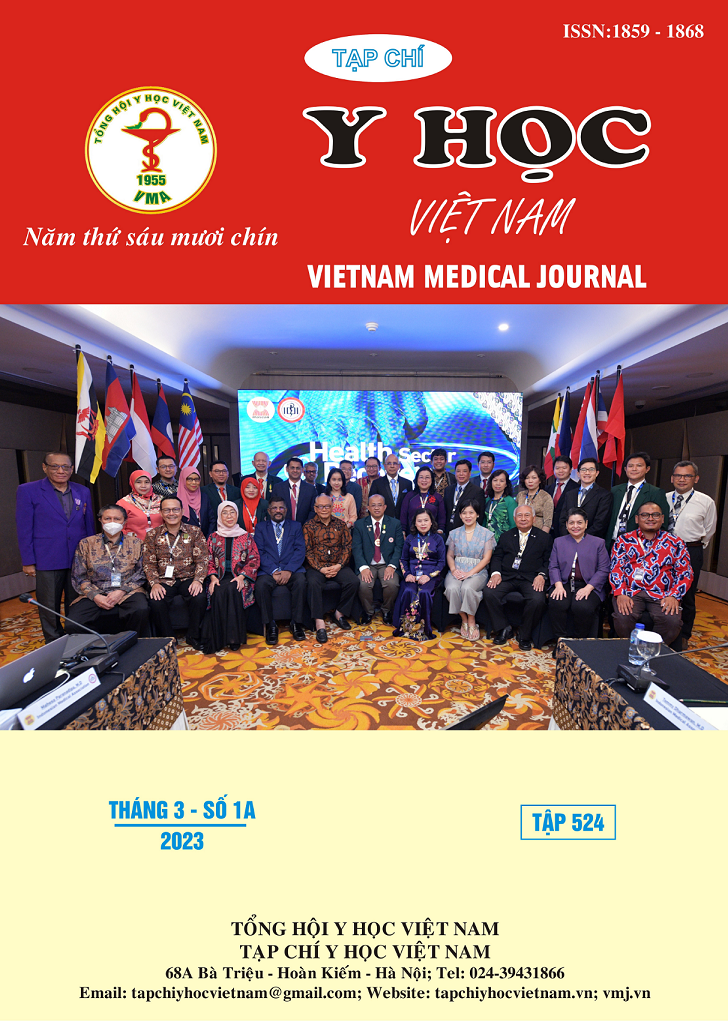INITIAL RESULTS OF REPLACING ESOPHAGUS BY USING TOTAL STOMACH IN THORACOSCOPIC ESOPHAGECTOMY TO TREATMENT ESOPHAGEAL CANCER
Main Article Content
Abstract
Background and Objectives: Esophageal cancer is a common disease of the gastrointestinal tract. Surgery is considered to be the most effective curative treatment available today. After esophagectomy, the use of plastic stomach to replace the cut esophagus is very important and it greatly determines the success of surgery. We proceed with the method of using the whole stomach to replace the cut esophagus without shrinking the stomach into a tube like before. Methods: This is a prospective study on a group of esophageal cancer patients undergoing esophagectomy and esophagectomy to replace the whole stomach. Results: During the period from June 2021 to May 2022, we performed endoscopic esophagectomy with lymph node dissection and esophagectomy with the entire stomach for 6 patients. All men, aged between 55 and 65 years, were diagnosed with lower third thoracic esophageal cancer. The duration of gastric bypass for esophageal segment replacement is from 30 minutes to 45 minutes. There were no intraoperative complications, 1 patient had slow gastric circulation in the postoperative period. One month after surgery, one patient had reflux after eating. After 3 months of surgery, the results were completely good. Conclusion: Preliminary results show that using the whole stomach to replace the cut esophagus in surgery for esophageal cancer gives good results.
Article Details
Keywords
Esophageal cancer, surgical treatment of esophageal cancer
References
2. Pennathur A, Gibson MK, Jobe BA, Luketich JD. Oesophageal carcinoma. The Lancet. 2013;381(9864):400-412. doi:10.1016/s0140-6736(12)60643-6
3. Watanabe M, Otake R, Kozuki R, et al. Recent progress in multidisciplinary treatment for patients with esophageal cancer. Surgery today. Jan 2020;50(1):12-20. doi:10.1007/s00595-019-01878-7
4. Harada K, Rogers JE, Iwatsuki M, Yamashita K, Baba H, Ajani JA. Recent advances in treating oesophageal cancer. F1000Research. 2020;9doi:10.12688/f1000research.22926.1
5. Fabbi M, Hagens ERC, van Berge Henegouwen MI, Gisbertz SS. Anastomotic leakage after esophagectomy for esophageal cancer: definitions, diagnostics, and treatment. Diseases of the esophagus: official journal of the International Society for Diseases of the Esophagus. Jan 11 2021;34(1)doi: 10.1093/dote/doaa039
6. Pu S, Chen H, Zhou C, et al. Major Postoperative Complications in Esophageal Cancer After Minimally Invasive Esophagectomy Compared With Open Esophagectomy: An Updated Meta-analysis. The Journal of surgical research. Jan 2021;257:554-571. doi:10.1016/ j.jss.2020.08.011
7. Yoshida K, Tanaka Y, Imai T, et al. Subtotal stomach in esophageal reconstruction surgery achieves an anastomotic leakage rate of less than 1%. Annals of gastroenterological surgery. Jul 2020;4(4):422-432. doi:10.1002/ags3.12336
8. Xu QL, Li H, Zhu YJ, Xu G. The treatments and postoperative complications of esophageal cancer: a review. Journal of cardiothoracic surgery. Jul 6 2020;15(1):163. doi:10.1186/s13019-020-01202-2


